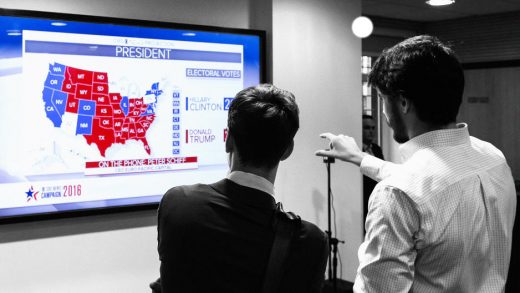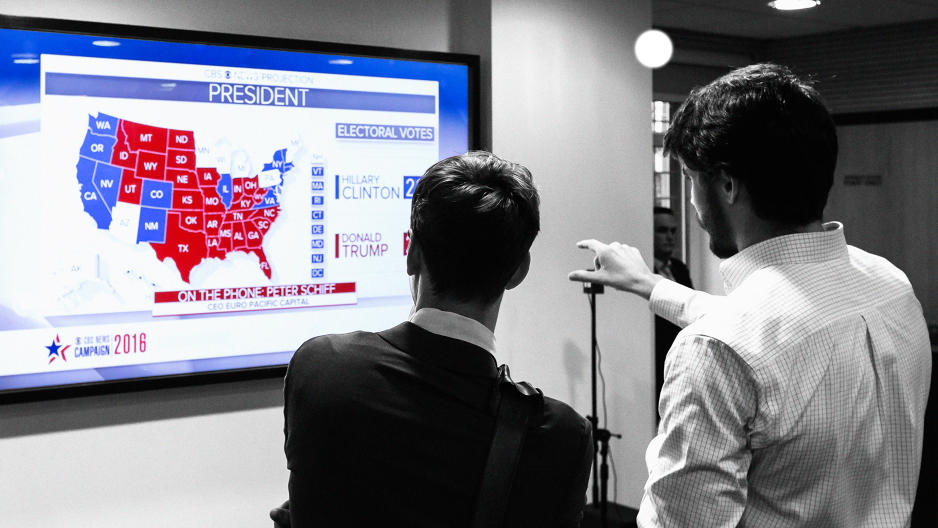What To Do And Where To Go If Your U.S. Livelihood Seems Shaky After Trump’s Win
In the waning hours of Tuesday night with votes still tallying up, Canada’s immigration website crashed, presumably as U.S. users scrambled to figure out how to move across the border.
At many points in the long, ugly campaign that finally culminated in Donald Trump’s election to the U.S. presidency this week, many Americans vowed they’d move abroad if their candidate lost. There was always something unpatriotic about that sentiment: Democracy doesn’t just work best when there’s a loyal opposition, its very existence depends on it.
But for many, a Trump presidency poses very real risks. The president-elect campaigned vigorously on tightening immigration policy, including deporting millions of undocumented immigrants. He’s explicitly singled out religious and ethnic groups including Muslims and Mexicans as unwelcome and has stoked implicit suspicions about Jews. Trump has also shown overt disrespect and contempt for women in his actions, rhetoric, and hiring practices.
For the millions of Americans that the country’s uneven patchwork of anti-discrimination protections doesn’t protect, Trump’s views—combined with a Republican-controlled Congress eager to rewrite immigration laws and a Supreme Court likely to lurch to the right—may pose genuine risks for continuing to live and work in the U.S.
That may mean taking a sober look at what options there are overseas.
Where To Go
Moving abroad doesn’t always mean securing a full-time position at a company based in another city. Many—particularly younger professionals—are choosing to go solo by taking on independent work in a series of different locations.
According to one such “digital nomad,” certain cities around the world are emerging as quasi-hubs for expat independent workers, from Ubud, Bali, in Indonesia to Yerevan, Armenia. Some of these communities are growing up in what just a few years ago were tourist centers. But then vacationers began to stay put.
That’s how one first-time “solopreneur” found herself permanently based in Belize. After a 12-year career in Silicon Valley, Barrett wrote earlier this year for Fast Company, she decided to ditch the U.S. and set up shop for herself on the beach she’d originally visited on holiday.
Other emerging centers for independent knowledge work are high-tech metropolises, but the costs of living are still much lower than most urban areas in the U.S. Arianna O’Dell, a digital nomad who’s also shared her experiences for Fast Company, points to Taipei, Taiwan, and Johor Bahru, Malaysia, just over a bridge from the Singapore. Cappuccinos cost less than 60¢ there, she reports, and a $5 lunch in Taipei counts as overpriced.
(And while it’s a more extreme option, some people manage to earn a steady income from the deck of a ship, barely ever touching down on dry land.)
How To Do It
In O’Dell’s experience, certain fields are proving more fertile for digital nomads than others. But the technological capabilities required for living and working overseas aren’t very onerous, she points out. Expat graphic designers, web developers, marketers, and PR and publicity professionals are making it work all over the world.
The options may not just be limited to those who offer digital products and services, though. By contracting with a distribution partner for fulfillment in local markets, you can even run an e-commerce business overseas and still keep your overhead way down.
Sorting out the proper visas and taxation issues can be a headache, but unless a Trump Administration overhauls the U.S. tax code (which is certainly a possibility), all income that Americans earn abroad is taxed the same as earnings within the country. But it isn’t hard to track down CPAs who specialize in expat taxes for regular people, not just for billionaires dumping assets into shady offshore accounts. And the Foreign Earned Income Inclusion allows overseas workers to declare certain living expenses (including big-ticket stuff like rent and utilities) as up to 30% tax deductible.
Those turning to self-employment for the first time—whether inside the U.S. or abroad—also need to decide how to classify that work. Freelancing isn’t the only option. There may be advantages to setting up an LLC or a sole proprietorship depending on the type of work you want to do. That’s as much a temperamental decision as a business one, Fast Company contributor Suzan Bond points out, in this helpful primer for newcomers to independent work.
What Else To Consider
The next four years may make life and work difficult for some folks in the U.S. But that doesn’t mean they’ll find paradise abroad. Our careers hardwire many of us to think like employees to a degree that we only truly realize once we’ve become our own bosses, Bond points out.
Our expectations, habits, mind-sets, and even the way we manage our personal finances all have to shift—often continuously and in unforeseen ways—which can make the transition difficult and hard to sustain. Case in point: Barrett was surprised to find she needed to manage the anxiety associated with not working enough. “I do have to keep reminding myself that just because I finished my day in three hours, it doesn’t mean I’m slacking off on building my business,” she explains.
But that newfound freedom my surprise you, even if your Wi-Fi connection sometimes cuts out. O’Dell says that she’s found the experience less lonely than she’d anticipated. Expats like her are crowding into more international cities, making it pretty easy to add a network of friends and colleagues.
With a little legwork on social media, she says, it’s actually pretty easy to surround yourself with a supportive community on the go. And a supportive community will be something many people will depend on in the months and years ahead. It’s the duty of every decent American—no matter how they voted on Tuesday—to offer that to one another. But for those who can’t find it on U.S. soil, there’s still hope of security, a community, meaningful work, and prosperity abroad.
The world is growing more interconnected, even as political movements around the globe seek to slow that down. Think about the last time your Wi-Fi connection frayed or crapped out completely. It might’ve hampered your work, but it probably didn’t upend your career. Whatever walls go up or systems go down, humans are resourceful and resilient when they need to be.
Fast Company , Read Full Story
(19)














